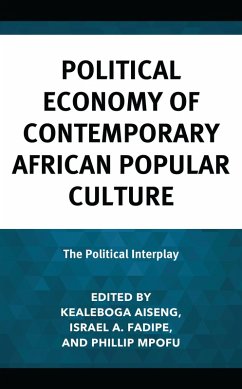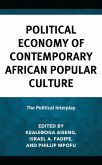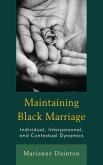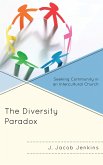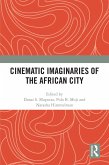Political Economy of Contemporary African Popular Culture (eBook, PDF)
The Political Interplay
Redaktion: Aiseng, Kealeboga; Mpofu, Phillip; Fadipe, Israel A.
79,95 €
79,95 €
inkl. MwSt.
Sofort per Download lieferbar

40 °P sammeln
79,95 €
Als Download kaufen

79,95 €
inkl. MwSt.
Sofort per Download lieferbar

40 °P sammeln
Jetzt verschenken
Alle Infos zum eBook verschenken
79,95 €
inkl. MwSt.
Sofort per Download lieferbar
Alle Infos zum eBook verschenken

40 °P sammeln
Political Economy of Contemporary African Popular Culture (eBook, PDF)
The Political Interplay
Redaktion: Aiseng, Kealeboga; Mpofu, Phillip; Fadipe, Israel A.
- Format: PDF
- Merkliste
- Auf die Merkliste
- Bewerten Bewerten
- Teilen
- Produkt teilen
- Produkterinnerung
- Produkterinnerung

Bitte loggen Sie sich zunächst in Ihr Kundenkonto ein oder registrieren Sie sich bei
bücher.de, um das eBook-Abo tolino select nutzen zu können.
Hier können Sie sich einloggen
Hier können Sie sich einloggen
Sie sind bereits eingeloggt. Klicken Sie auf 2. tolino select Abo, um fortzufahren.

Bitte loggen Sie sich zunächst in Ihr Kundenkonto ein oder registrieren Sie sich bei bücher.de, um das eBook-Abo tolino select nutzen zu können.
Drawing on examples from across the continent, this volume examines socially significant aspects of contemporary African popular culture-including music cultures, fandoms, and community, mass, and digital media-to demonstrate how neoliberal politics and market forces shape the cultural landscape and vice versa. Contributors investigate the role that the media, politicians, and corporate interests play in shaping that landscape, highlight the crucial role of the African people in the production and circulation of popular culture more broadly, and, furthermore, demonstrate how popular culture…mehr
- Geräte: PC
- mit Kopierschutz
- eBook Hilfe
- Größe: 3.08MB
Andere Kunden interessierten sich auch für
![Political Economy of Contemporary African Popular Culture (eBook, ePUB) Political Economy of Contemporary African Popular Culture (eBook, ePUB)]() Political Economy of Contemporary African Popular Culture (eBook, ePUB)79,95 €
Political Economy of Contemporary African Popular Culture (eBook, ePUB)79,95 €![Advancing the Civil Rights Movement (eBook, PDF) Advancing the Civil Rights Movement (eBook, PDF)]() Michael DiBari Jr.Advancing the Civil Rights Movement (eBook, PDF)29,95 €
Michael DiBari Jr.Advancing the Civil Rights Movement (eBook, PDF)29,95 €![Maintaining Black Marriage (eBook, PDF) Maintaining Black Marriage (eBook, PDF)]() Marianne DaintonMaintaining Black Marriage (eBook, PDF)68,95 €
Marianne DaintonMaintaining Black Marriage (eBook, PDF)68,95 €![Latina/o/x Communication Studies (eBook, PDF) Latina/o/x Communication Studies (eBook, PDF)]() Latina/o/x Communication Studies (eBook, PDF)33,95 €
Latina/o/x Communication Studies (eBook, PDF)33,95 €![The Diversity Paradox (eBook, PDF) The Diversity Paradox (eBook, PDF)]() J. Jacob JenkinsThe Diversity Paradox (eBook, PDF)75,95 €
J. Jacob JenkinsThe Diversity Paradox (eBook, PDF)75,95 €![Desegregation and the Rhetorical Fight for African American Citizenship Rights (eBook, PDF) Desegregation and the Rhetorical Fight for African American Citizenship Rights (eBook, PDF)]() Sally F. PaulsonDesegregation and the Rhetorical Fight for African American Citizenship Rights (eBook, PDF)30,95 €
Sally F. PaulsonDesegregation and the Rhetorical Fight for African American Citizenship Rights (eBook, PDF)30,95 €![Cinematic Imaginaries of the African City (eBook, PDF) Cinematic Imaginaries of the African City (eBook, PDF)]() Cinematic Imaginaries of the African City (eBook, PDF)40,95 €
Cinematic Imaginaries of the African City (eBook, PDF)40,95 €-
-
-
Drawing on examples from across the continent, this volume examines socially significant aspects of contemporary African popular culture-including music cultures, fandoms, and community, mass, and digital media-to demonstrate how neoliberal politics and market forces shape the cultural landscape and vice versa. Contributors investigate the role that the media, politicians, and corporate interests play in shaping that landscape, highlight the crucial role of the African people in the production and circulation of popular culture more broadly, and, furthermore, demonstrate how popular culture can be used as a tool to resist oppressive regimes and challenge power structures in the African context. Scholars of political communication, cultural studies, and African studies will find this book particularly useful.
Produktdetails
- Produktdetails
- Verlag: Bloomsbury eBooks US
- Seitenzahl: 376
- Erscheinungstermin: 1. April 2024
- Englisch
- ISBN-13: 9798216338185
- Artikelnr.: 74835989
- Verlag: Bloomsbury eBooks US
- Seitenzahl: 376
- Erscheinungstermin: 1. April 2024
- Englisch
- ISBN-13: 9798216338185
- Artikelnr.: 74835989
- Herstellerkennzeichnung Die Herstellerinformationen sind derzeit nicht verfügbar.
Kealeboga Aiseng is senior lecturer in the journalism and media studies department at Rhodes University. Israel A. Fadipe is lecturer in the faculty of communication and media studies at Ajayi Crowther University. Phillip Mpofu is researcher at North West University.
Introduction: The Interplay between Politics and African Popular Culture
Part 1: Politics, Political Economy, and Society
Chapter One: Promoting Political Participation and Accountability through
Popular Culture: A Study on Women and Community Radio in Northern Ghana
Chapter Two: African Humanism, Liberal Populism, and the Politics of
Antiblack Culture
Chapter Three: Contextualizing Chronicle's Construction of Cont Mhlanga's
'Heroism': Arts, Politics, and Ethnicity Nexus
Chapter Four: Political Godfatherism, Propaganda, and the Media in the
Nigerian Political Scene: A Study of 'Oba' in King of Boys
Chapter Five: 'Tsotsitaal,' the Commodification of Language by South
Africa's Main Political Parties During Election Campaign Advertisements
Part 2: Entertainment Industry, Sports, Political Economy, and Society
Chapter Six: Influence of Hip-Hop Culture and Music Videos on Students
Living in South African Private Mixed Residences: A Case Study
Chapter Seven: Imperialist Allusions in Debo Adedayo's Elizabeth the
Terminator
Chapter Eight: A Survey of Nigerian Youths on Political Participation and
Political Apathy: A Case Study of Kemi Adetiba's King of Boys
Chapter Nine: "Divided in Nigeria, United by Football": An Exploration of
Football Fandom Culture as a Motivating Factor for Communication and Unity
among Nigerian Youths
Chapter Ten: Comparative Political-Economic Case-Evaluation of Benue
Musicians amidst Politically-Hyped Western Digital Musical-Artistry
Chapter Eleven: 'Eat or Be Eaten': Cannibalism-Political Economy Nexus in
African Football News Reports
Chapter Twelve: 'What Scares me is what scares you': Producing Commercially
Viable South African Horror Films for Local and International Target
Audiences
Part 3: Digital Media, Political Economy, and Society
Chapter Thirteen: The Political Economy of New Media in Nigeria's Fourth
Republic: Insights from #Nigeria Twitter Ban
Chapter Fourteen: The Political Economy of Digital and Social Media
Influencer Marketing: A Reception Analysis of Coca-Cola's Digital Marketing
among Young Adult Nigerians
Chapter Fifteen: Realist or Chauvinist? A Critique of Tawona Shadaya
Knight's Tweets Concerning Objectification of Women
Chapter Sixteen: Weaponizing Political Rhetoric to Galvanise Voters'
Support on the Twitterscape: Case Study of Contentious Political Spheres in
South Africa and Nigeria
Part 4: Fake News, Crime, Political Economy, and Society
Chapter Seventeen: Fake News and Misinformation and Their Impacts on Public
Perceptions of Reality in Kenya: A Literature Review
Chapter Eighteen: New Wine Versus Old Wine: Internet Praxis Begets New
Social Reality of Power Relations between the Young and the Old in the
Swedru Municipality
Chapter Nineteen: Mobile Phones as 'Engine Boat' of Political Economy of
the Media: A Study across Print Media in Lagos, Nigeria
Conclusion: The Political Economy of Popular African Culture in the
Information Age: Some Thoughts
Part 1: Politics, Political Economy, and Society
Chapter One: Promoting Political Participation and Accountability through
Popular Culture: A Study on Women and Community Radio in Northern Ghana
Chapter Two: African Humanism, Liberal Populism, and the Politics of
Antiblack Culture
Chapter Three: Contextualizing Chronicle's Construction of Cont Mhlanga's
'Heroism': Arts, Politics, and Ethnicity Nexus
Chapter Four: Political Godfatherism, Propaganda, and the Media in the
Nigerian Political Scene: A Study of 'Oba' in King of Boys
Chapter Five: 'Tsotsitaal,' the Commodification of Language by South
Africa's Main Political Parties During Election Campaign Advertisements
Part 2: Entertainment Industry, Sports, Political Economy, and Society
Chapter Six: Influence of Hip-Hop Culture and Music Videos on Students
Living in South African Private Mixed Residences: A Case Study
Chapter Seven: Imperialist Allusions in Debo Adedayo's Elizabeth the
Terminator
Chapter Eight: A Survey of Nigerian Youths on Political Participation and
Political Apathy: A Case Study of Kemi Adetiba's King of Boys
Chapter Nine: "Divided in Nigeria, United by Football": An Exploration of
Football Fandom Culture as a Motivating Factor for Communication and Unity
among Nigerian Youths
Chapter Ten: Comparative Political-Economic Case-Evaluation of Benue
Musicians amidst Politically-Hyped Western Digital Musical-Artistry
Chapter Eleven: 'Eat or Be Eaten': Cannibalism-Political Economy Nexus in
African Football News Reports
Chapter Twelve: 'What Scares me is what scares you': Producing Commercially
Viable South African Horror Films for Local and International Target
Audiences
Part 3: Digital Media, Political Economy, and Society
Chapter Thirteen: The Political Economy of New Media in Nigeria's Fourth
Republic: Insights from #Nigeria Twitter Ban
Chapter Fourteen: The Political Economy of Digital and Social Media
Influencer Marketing: A Reception Analysis of Coca-Cola's Digital Marketing
among Young Adult Nigerians
Chapter Fifteen: Realist or Chauvinist? A Critique of Tawona Shadaya
Knight's Tweets Concerning Objectification of Women
Chapter Sixteen: Weaponizing Political Rhetoric to Galvanise Voters'
Support on the Twitterscape: Case Study of Contentious Political Spheres in
South Africa and Nigeria
Part 4: Fake News, Crime, Political Economy, and Society
Chapter Seventeen: Fake News and Misinformation and Their Impacts on Public
Perceptions of Reality in Kenya: A Literature Review
Chapter Eighteen: New Wine Versus Old Wine: Internet Praxis Begets New
Social Reality of Power Relations between the Young and the Old in the
Swedru Municipality
Chapter Nineteen: Mobile Phones as 'Engine Boat' of Political Economy of
the Media: A Study across Print Media in Lagos, Nigeria
Conclusion: The Political Economy of Popular African Culture in the
Information Age: Some Thoughts
Introduction: The Interplay between Politics and African Popular Culture
Part 1: Politics, Political Economy, and Society
Chapter One: Promoting Political Participation and Accountability through
Popular Culture: A Study on Women and Community Radio in Northern Ghana
Chapter Two: African Humanism, Liberal Populism, and the Politics of
Antiblack Culture
Chapter Three: Contextualizing Chronicle's Construction of Cont Mhlanga's
'Heroism': Arts, Politics, and Ethnicity Nexus
Chapter Four: Political Godfatherism, Propaganda, and the Media in the
Nigerian Political Scene: A Study of 'Oba' in King of Boys
Chapter Five: 'Tsotsitaal,' the Commodification of Language by South
Africa's Main Political Parties During Election Campaign Advertisements
Part 2: Entertainment Industry, Sports, Political Economy, and Society
Chapter Six: Influence of Hip-Hop Culture and Music Videos on Students
Living in South African Private Mixed Residences: A Case Study
Chapter Seven: Imperialist Allusions in Debo Adedayo's Elizabeth the
Terminator
Chapter Eight: A Survey of Nigerian Youths on Political Participation and
Political Apathy: A Case Study of Kemi Adetiba's King of Boys
Chapter Nine: "Divided in Nigeria, United by Football": An Exploration of
Football Fandom Culture as a Motivating Factor for Communication and Unity
among Nigerian Youths
Chapter Ten: Comparative Political-Economic Case-Evaluation of Benue
Musicians amidst Politically-Hyped Western Digital Musical-Artistry
Chapter Eleven: 'Eat or Be Eaten': Cannibalism-Political Economy Nexus in
African Football News Reports
Chapter Twelve: 'What Scares me is what scares you': Producing Commercially
Viable South African Horror Films for Local and International Target
Audiences
Part 3: Digital Media, Political Economy, and Society
Chapter Thirteen: The Political Economy of New Media in Nigeria's Fourth
Republic: Insights from #Nigeria Twitter Ban
Chapter Fourteen: The Political Economy of Digital and Social Media
Influencer Marketing: A Reception Analysis of Coca-Cola's Digital Marketing
among Young Adult Nigerians
Chapter Fifteen: Realist or Chauvinist? A Critique of Tawona Shadaya
Knight's Tweets Concerning Objectification of Women
Chapter Sixteen: Weaponizing Political Rhetoric to Galvanise Voters'
Support on the Twitterscape: Case Study of Contentious Political Spheres in
South Africa and Nigeria
Part 4: Fake News, Crime, Political Economy, and Society
Chapter Seventeen: Fake News and Misinformation and Their Impacts on Public
Perceptions of Reality in Kenya: A Literature Review
Chapter Eighteen: New Wine Versus Old Wine: Internet Praxis Begets New
Social Reality of Power Relations between the Young and the Old in the
Swedru Municipality
Chapter Nineteen: Mobile Phones as 'Engine Boat' of Political Economy of
the Media: A Study across Print Media in Lagos, Nigeria
Conclusion: The Political Economy of Popular African Culture in the
Information Age: Some Thoughts
Part 1: Politics, Political Economy, and Society
Chapter One: Promoting Political Participation and Accountability through
Popular Culture: A Study on Women and Community Radio in Northern Ghana
Chapter Two: African Humanism, Liberal Populism, and the Politics of
Antiblack Culture
Chapter Three: Contextualizing Chronicle's Construction of Cont Mhlanga's
'Heroism': Arts, Politics, and Ethnicity Nexus
Chapter Four: Political Godfatherism, Propaganda, and the Media in the
Nigerian Political Scene: A Study of 'Oba' in King of Boys
Chapter Five: 'Tsotsitaal,' the Commodification of Language by South
Africa's Main Political Parties During Election Campaign Advertisements
Part 2: Entertainment Industry, Sports, Political Economy, and Society
Chapter Six: Influence of Hip-Hop Culture and Music Videos on Students
Living in South African Private Mixed Residences: A Case Study
Chapter Seven: Imperialist Allusions in Debo Adedayo's Elizabeth the
Terminator
Chapter Eight: A Survey of Nigerian Youths on Political Participation and
Political Apathy: A Case Study of Kemi Adetiba's King of Boys
Chapter Nine: "Divided in Nigeria, United by Football": An Exploration of
Football Fandom Culture as a Motivating Factor for Communication and Unity
among Nigerian Youths
Chapter Ten: Comparative Political-Economic Case-Evaluation of Benue
Musicians amidst Politically-Hyped Western Digital Musical-Artistry
Chapter Eleven: 'Eat or Be Eaten': Cannibalism-Political Economy Nexus in
African Football News Reports
Chapter Twelve: 'What Scares me is what scares you': Producing Commercially
Viable South African Horror Films for Local and International Target
Audiences
Part 3: Digital Media, Political Economy, and Society
Chapter Thirteen: The Political Economy of New Media in Nigeria's Fourth
Republic: Insights from #Nigeria Twitter Ban
Chapter Fourteen: The Political Economy of Digital and Social Media
Influencer Marketing: A Reception Analysis of Coca-Cola's Digital Marketing
among Young Adult Nigerians
Chapter Fifteen: Realist or Chauvinist? A Critique of Tawona Shadaya
Knight's Tweets Concerning Objectification of Women
Chapter Sixteen: Weaponizing Political Rhetoric to Galvanise Voters'
Support on the Twitterscape: Case Study of Contentious Political Spheres in
South Africa and Nigeria
Part 4: Fake News, Crime, Political Economy, and Society
Chapter Seventeen: Fake News and Misinformation and Their Impacts on Public
Perceptions of Reality in Kenya: A Literature Review
Chapter Eighteen: New Wine Versus Old Wine: Internet Praxis Begets New
Social Reality of Power Relations between the Young and the Old in the
Swedru Municipality
Chapter Nineteen: Mobile Phones as 'Engine Boat' of Political Economy of
the Media: A Study across Print Media in Lagos, Nigeria
Conclusion: The Political Economy of Popular African Culture in the
Information Age: Some Thoughts
